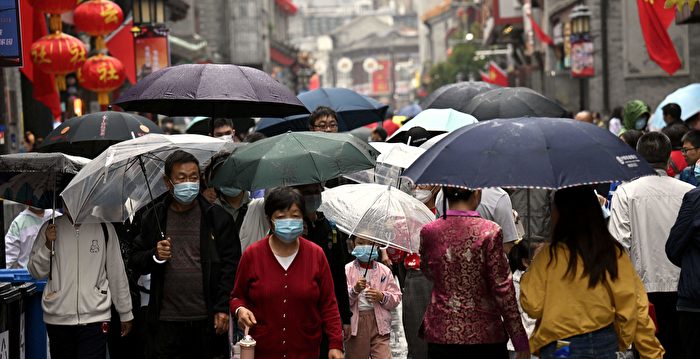[The Epoch Times, October 7, 2022](The Epoch Times reporter Chen Ting comprehensive report) Affected by the strict “zero policy”, China’s consumption during the 11th holiday this year collapsed, and the number of passengers from railways to the box office of movie theaters fell sharply. This is bad news for China’s consumption recovery.
Between Sept. 28 and Oct. 8, the number of rail passengers is expected to be 68.5 million, down about 38 percent from 110 million a year earlier, Bloomberg said, citing data from China National Railway Group (link).
At the same time, the movie box office has also dropped sharply. According to data from the online movie entertainment platform Maoyan Entertainment, as of 1 p.m. local time in China on Friday (October 7), sales were only 1.4 billion yuan (about 197 million US dollars). That’s less than a third of last year’s seven-day holiday box office, and a far cry from the nearly 4 billion yuan in 2020.
Weak consumption numbers are bad news for China’s consumption recovery amid a sluggish economy. Despite some policies by the authorities, the slump in China’s housing market shows no signs of abating, global demand for Chinese goods is slowing and currencies are plunging.
Some economists believe Beijing is unlikely to ease its “zero policy” until March next year.
Bloomberg noted that China’s deteriorating economy has coincided with a broad recession across Asia from industries ranging from electric vehicles to memory chips to online shopping, meaning the economic outlook could be even more worrying going forward.
More recently, as memory chip makers faced a sharp drop in orders and Samsung Electronics Co reported its first profit drop since 2019, soaring inflation and macroeconomic conditions of higher interest rates are hitting consumer sentiment and many households tightening their budgets.
At present, the number of COVID-19 cases officially announced by the Chinese Communist Party has hit the highest number in about a month, and the authorities are facing increasing pressure to prevent the virus from spreading further before the 20th National Congress of the Communist Party of China.
Authorities have urged residents to stay at home during the seven-day long holiday, usually the peak annual tourist season, and have ordered lockdowns after many areas experienced sporadic outbreaks.
Experts downgrade China’s GDP forecast for this year
According to the latest survey by the Nikkei, a number of economists have once again lowered their forecasts for China’s gross domestic product (GDP) growth this year.
According to Nikkei Asia (link), experts predict China’s economic growth rate in 2022 will fall between 2.2% and 4.1%, with the average forecast of 31 respondents being 3.2%.
This result is much lower than the average of 4.1% in the June survey and 5% in the March survey, and far below the 5.5% published by the Chinese authorities earlier this year.
Eight of the 31 respondents said China’s economic growth will be below 3% this year, with economists at Barclays and Societe Generale forecasting growth of 2.6% and 2.7%, respectively.
Allianz Group economist Francoise Huang lowered his growth forecast for 2022 to 2.9% from 4.1% earlier and to 4.5% for 2023 from 5.2%.
Huang Liyang mentioned weak exports and the “zero-clearing policy” that may last until the second quarter of 2023, which has weighed on business and household confidence, while also mentioning “risks in the real estate industry” as a headwind.
China’s housing market has been hit by developer bond defaults, which have left a slew of projects unfinished, sparking a nationwide wave of homebuyers to stop lending and sparking a collapse in confidence in the sector. The industry accounts for about a quarter of China’s GDP.
“The real estate shock and the zero policy are putting increasing downward pressure on economic growth,” said Tetsuji Sano, chief Asia economist at Sumitomo Mitsui Desi Investment Management.
“As long as the policy on the housing market and the zeroing policy remains in place, it will be almost impossible to lead the economic recovery through fiscal policy and interest rate cuts,” he said.
When asked what are China’s main economic challenges this year and in 2023, most economists mentioned: the Chinese authorities’ “zero policy” and “the housing market downturn”, followed by “weak consumer confidence” and “exports” Demand has weakened.”
Responsible editor: Ye Ziwei#
